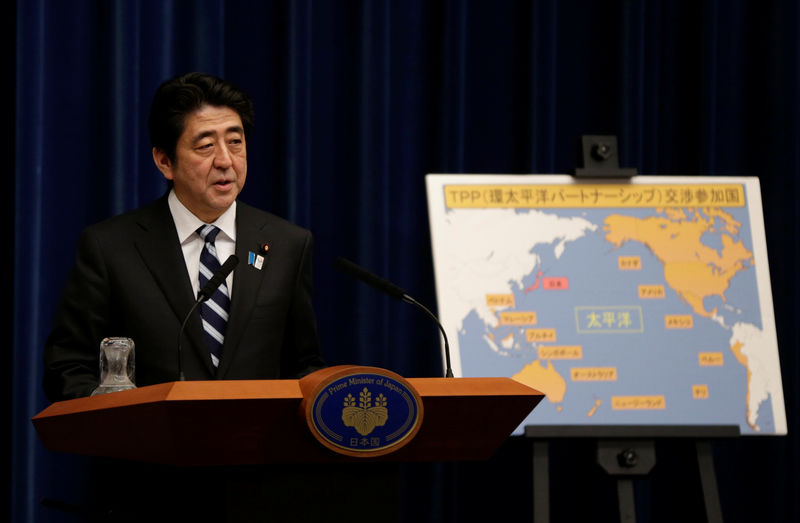By Linda Sieg and Izumi Nakagawa
TOKYO (Reuters) - Japan is cool to the notion of inviting China to join a pan-Pacific trade pact abandoned by U.S. President Donald Trump, fearing such a step would boost Beijing's clout and water down what was meant to be the 'gold standard' for rules of trade.
Nor are government officials eager to begin two-way trade talks with Washington, despite Trump's stated preference for bilateral deals as part of his "America First" economic plans, although some said such negotiations could not be ruled out.
For now, that has left Prime Minister Shinzo Abe in the unenviable position of pledging yet again to persuade Trump that the Trans-Pacific Partnership (TPP) is in the interests of both the United States and the global economy. The new president signed an executive order withdrawing from the TPP on Monday.
"The free trade system based on free and fair common rules is the source of growth for the world economy," Abe told parliament's upper house on Wednesday.
"I think President Trump also understands the importance of free and fair trade, and I want to steadfastly seek his understanding of the strategic and economic significance of the TPP agreement."
Asked about talks on a U.S.-Japan trade deal, Abe said he would refrain from speculating about Trump's trade policy until his cabinet line-up was approved and policies became clearer.
Australia and New Zealand said on Tuesday they hoped to salvage the TPP by encouraging China and other Asian countries to join. Chile has invited ministers from other TPP countries and China and South Korea to a summit in March to discuss how to proceed. The TPP cannot take effect without U.S. participation unless rules are changed, so the deal is now in deep freeze.
Japan had hoped the TPP would help anchor security ally Washington in Asia and create a rule-based regime that would eventually draw in China. Abe also touted the 12-nation pact as an engine of domestic economic reform and growth.
WATERING DOWN?
But inviting China to the TPP table now risks boosting Beijing's clout while weakening the partnership's rules of trade on matters from intellectual property protection and principles for currency management to support for state-owned enterprises.
China has not made clear whether it would be interested in joining the TPP. But Beijing is pushing a proposed 16-nation Regional Comprehensive Economic Partnership (RCEP) that has less ambitious goals on trade rules. Progress so far has been slow.
"If TPP is diluted by bringing in China, it will not be worth while investing energy to achieve that," said a Japanese source familiar with government thinking.
"Negotiating with China with possibility of changing what was signed is not wise. It will take years and the result may be watering down of ambitions," the source said.
Su Xiaohui, a senior researcher at the Chinese foreign ministry-backed China Institute of International Studies, wrote in an article published on Wednesday in the People's Daily Overseas Edition that Abe was still "unable to accept reality" even after Trump's executive order.
"The reason Abe is unable to accept the current situation is because the TPP is of excessive strategic importance to Japan. From Japan’s perspective, the TPP is a key part of the Japan-U.S. alliance," Su said.
"Seeing the disputes surrounding the TPP from the U.S. and Japan, China is even more determined to participate and promote integration in the Asia-Pacific region,” Su said.
China also supports a separate Asia-Pacific pact promoted by Southeast Asian nations.
TWO-WAY DEALS
Trump has made clear he favours two-way trade deals over multilateral ones, although a Republican-dominated Congress might be able to muster the votes to approve TPP if the President were to have a change of heart.
Trump has also attacked Japan's auto market as closed in an echo of criticism heard decades ago. Japanese trade minister Hiroshige Seko this week rejected that criticism, saying Japan does not impose tariffs on U.S. auto imports nor put up discriminatory non-tariff barriers.
Bilateral U.S.-Japan negotiations would likely put renewed pressure on politically vocal farmers, some of whose products such as rice would remain protected even under TPP.
Bilateral talks "are possible," said another source familiar with Japanese government thinking. "But I think if negotiations began, they'd be very difficult and take a very long time."
